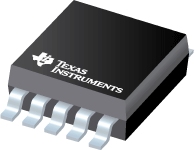Datasheet Texas Instruments TPS62056DGSRG4
| Manufacturer | Texas Instruments |
| Series | TPS62056 |
| Part Number | TPS62056DGSRG4 |

3.3-V Output, 800-mA, 10V Vin, 95% Efficient Step-Down Converter in MSOP-10 10-VSSOP -40 to 85
Datasheets
TPS6205x 800-mA Synchronous Step-Down Converter datasheet
PDF, 1.1 Mb, Revision: F, File published: Jun 26, 2015
Extract from the document
Prices
Status
| Lifecycle Status | Active (Recommended for new designs) |
| Manufacture's Sample Availability | No |
Packaging
| Pin | 10 |
| Package Type | DGS |
| Industry STD Term | VSSOP |
| JEDEC Code | S-PDSO-G |
| Package QTY | 2500 |
| Carrier | LARGE T&R |
| Device Marking | BGG |
| Width (mm) | 3 |
| Length (mm) | 3 |
| Thickness (mm) | 1.02 |
| Pitch (mm) | .5 |
| Max Height (mm) | 1.07 |
| Mechanical Data | Download |
Parametrics
| Control Mode | Voltage Mode |
| Duty Cycle(Max) | 100 % |
| Iout(Max) | 0.8 A |
| Iq(Typ) | 0.012 mA |
| Operating Temperature Range | -40 to 85 C |
| Package Group | VSSOP |
| Rating | Catalog |
| Regulated Outputs | 1 |
| Special Features | Enable,Frequency Synchronization,Light Load Efficiency,Power Good,Synchronous Rectification |
| Switching Frequency(Max) | 1000 kHz |
| Switching Frequency(Min) | 600 kHz |
| Type | Converter |
| Vin(Max) | 10 V |
| Vin(Min) | 2.7 V |
| Vout(Max) | 3.3 V |
| Vout(Min) | 3.3 V |
Eco Plan
| RoHS | Compliant |
Design Kits & Evaluation Modules
- Evaluation Modules & Boards: TPS62052EVM-234
TPS62052 Evaluation Module
Lifecycle Status: Active (Recommended for new designs) - Evaluation Modules & Boards: TPS62050EVM-234
TPS62050 Evaluation Module
Lifecycle Status: Active (Recommended for new designs)
Application Notes
- Adding Hysteresis to Low Battery Input on the TPS6205x (Rev. A)PDF, 89 Kb, Revision: A, File published: Nov 28, 2007
The low-battery input (LBI), available on several step-down converters, is often used to shut down the converter when the input voltage falls below a set threshold. This prevents damage to the battery and signals that the battery is at the end of its life and should be charged or replaced. Batteries have internal resistance that causes the voltage to drop as the load increases. This internal resis - Optimizing Resistor Dividers at a Comparator (Rev. A)PDF, 120 Kb, Revision: A, File published: Jun 3, 2013
- Optimizing Transient Response of Internally Compensated DC-DC Converters (Rev. A)PDF, 1.1 Mb, Revision: A, File published: May 11, 2015
- Five steps to a great PCB layout for a step-down converterPDF, 162 Kb, File published: Jan 29, 2015
- Understanding the Absolute Maximum Ratings of the SW Node (Rev. A)PDF, 755 Kb, Revision: A, File published: Jan 13, 2012
- Testing tips for applying external power to supply outputs without an input voltPDF, 110 Kb, File published: Oct 24, 2016
- Basic Calculation of a Buck Converter's Power Stage (Rev. B)PDF, 202 Kb, Revision: B, File published: Aug 17, 2015
- Extending the Soft Start Time Without a Soft Start Pin (Rev. B)PDF, 387 Kb, Revision: B, File published: Jun 15, 2017
- Choosing an Appropriate Pull-up/Pull-down Resistor for Open Drain OutputsPDF, 130 Kb, File published: Sep 19, 2011
- IQ: What it is what it isn’t and how to use itPDF, 198 Kb, File published: Jun 17, 2011
- Performing Accurate PFM Mode Efficiency Measurements (Rev. A)PDF, 418 Kb, Revision: A, File published: Dec 11, 2018
When performing measurements on DC-DC converters using pulse frequency modulation(PFM)or any power save mode proper care must be taken to ensure that the measurements are accurate. An accurate PFM mode efficiency measurement is critical for systems which require high efficiency at low loads such as in smart home systems tablets wearables and metering.
Model Line
Series: TPS62056 (4)
- TPS62056DGS TPS62056DGSG4 TPS62056DGSR TPS62056DGSRG4
Manufacturer's Classification
- Semiconductors > Power Management > Non-isolated DC/DC Switching Regulator > Step-Down (Buck) > Buck Converter (Integrated Switch)
